YOUR PARTNER FOR HOP BUSINESS
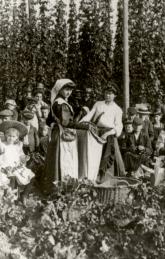
History of Hop Trading
Written proof of hop trading appear together with written reports about
hop growing. Hops were exported
on carts, waggons and by river in the llth century. They went mostly to
Prague Bavaria and Hanse town. The location of Prague in former trade,
the way of building roads, which ran from Prague in all directions, made
this town a centre for hop, grain and cattle trade. The main road went
through Zatec to Nuremberg and was known as the King's road and the
North salt route. The trade with the seaside towns had increased by The
reign of King Charles IV., who in 1375 made a journey to Luxemburg where
he made negotiations about trade among coastal countries and the Czech
country. We do not know the amount of this export at this time, but it
probably was not much. They used to sell surplus only.
Only with the progress of production and the foundation of towns was
there an increased amount of beer drinking and so hop growing. From the
point of quality there was growth of so called hop growing towns, which
as opposed to field growing had more of a trading character, and were
orientated more towards quality. Over the years the demand for Czech
hops increased. You could find them in Lithuania, Brandemburg, Hamburg,
Italy, Flanders and others. On the river Elbe it was shipped to Hamburg
on so called Forum humulli. In 1546 Ferdinand I. could order a tax on
hops, because the demand could not be endangered even by high custom's
duty.
At that time it was well known, that the best hops were from Klatovy,
Zatec and Ustek. Particulary Klatovy for its advantageous distance from
Bavaria and with that a cheaper transport, was looked on as a source of
quality hops. It was so good, that the town founded a special seal in
the year 1533 by which hop originality was ensured. The same
arrangements were also made by other towns a few years later, mostly in
Zatec and Rakovnik. In the second half of the lóth century Klatovy hops
had lost their popularity. The bavarian attention was set on better hops
in the Zatec and Ustek areas. The interest and high quality of these
hops brought about falsification attempts. Less valued and cheaper hops
were sold as though from Zatec. These efforts were so big, that even
arrangements of the towns against it were not successfull. So Marie
Theresa had to rectify the situation by her letters in 1758 to 1784.
To mention the technical side of trade, either the brewers came to buy
hop themselves,
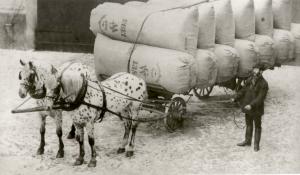 usualy
from their favourite town and grower or the merchants with their own or
purchased hops went to the distant breweries and offered the hops. While
the first way of trade was a safer way of purchase for the customers
than the other which faced certain risks. The cartman took the risk of
damaging his hops with rain, and with small demand and also low prices.
Many times they were forced to sell under price. This way of transport
and the risks, were very expensive. The trip with horse-cart was long
and the hop packed linen bags were very large.
usualy
from their favourite town and grower or the merchants with their own or
purchased hops went to the distant breweries and offered the hops. While
the first way of trade was a safer way of purchase for the customers
than the other which faced certain risks. The cartman took the risk of
damaging his hops with rain, and with small demand and also low prices.
Many times they were forced to sell under price. This way of transport
and the risks, were very expensive. The trip with horse-cart was long
and the hop packed linen bags were very large.
In the middle of the l9th century there was a great change in hop
trading. With the gradual arrival of the railway the hop merchants had
to stop cart trading. After introduction of telephone and telegraf,
communications spread more quickly. In autumn 1843 the hops were
weighted in so called Vienna cents (56 kg) and verifing papers are
introduced. From 1875 the decimal system was set and hops were weighted
in custom's cents (50 kg). Mainly the railway meant the biggest step in
hop trading. The transport reduced to 1/8 the price, it was faster and
protected hops against climatic changes.
In the 60's of the l9th century the hop trading law became common. It was never passed officially but was consistently kept. It divided the merchants into 3 groups - local, commissars and experts. The local traders were specialised in purchasing hops from the producers. The commissars exchanged and delivered hops for a fee.
From 1860 to 1879 there was a so called hop-market in Zatec.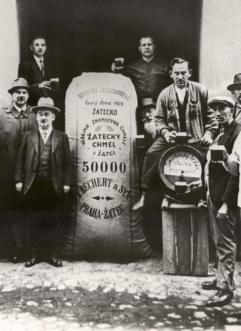 It was opened from October to December, on every Thursday. The main
Hop-merked was opened from l5th to 31 st October daily. By the use of
price and quality sorting were Zatec hops divided to town, district and
region. The Market was well known for íts strict control of production,
origin and quality. Each group of hops had its own attesting papers. The
ballots were marked by the so called big seal of the Zatec Hopmarket.
It was opened from October to December, on every Thursday. The main
Hop-merked was opened from l5th to 31 st October daily. By the use of
price and quality sorting were Zatec hops divided to town, district and
region. The Market was well known for íts strict control of production,
origin and quality. Each group of hops had its own attesting papers. The
ballots were marked by the so called big seal of the Zatec Hopmarket.
At that time sales technique was definitely formed. During the 50 years
the means of sale changed from house to house sale to capitalistic based
on the marked custom of the Bavarian business chamber. The amount of
local merchants had decreased and the market was in the hands of less
people. During the 70's there were 6 big companies, which took all the
local trade and purchase and export. They originated mainly from the
joining of house and local merchants. The first company was founded in
1866 by Martin Holy.
At the end of l9th century the Czech Hop-market was in the hands of
german capital. Limited partnership company, which was first founded as
the 1st czech business Hop company became the "First Czech Stock company
in Rakovník and Zatec" in the year 1898.
Together with the change of sale came also other changes which are tied
closely to the business. Operation on a railway from Prague to Chomutov
started in 1871, in 1872 another railway was opened from Pilsner to
Duchcov. At that time new transporting companies started operating, one
of them, the largest was the company of Eduard Fanta, which also
operated special railway carriages for hop transport.Increased market
demands and higher quality also caused changes in the packing. Former
linen used in packing ballots was replaced by jute.
Tin cylinders started to be used for better and longer storage in the
80's. Transport on sailing boats also brought up the need of storage of
packed goods in tinned boxes. High duty stopped bigger expansion of
these means of packing. Duty was payed for the whole weight and with
cylinders the metal also.
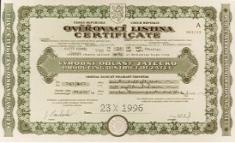
Further ímprovement of legal protection of hops was achieved in the
beginning of the 20th century. The dissension between towns, producers
and sellers went so far, that for some time there were two certification
institutions in the town - one was the town's and the other the growers.
The town lived on hops. There were for example 53 packing stations in
Zatec in the southern part of town. At that time there were 161
companies trading with hops. A few companies always used and shared one
packing station. Verifying didn't occur in the packing station as it's
done now, but hops were delivered to the certification building. The
transport was made by a separate group of people, who formed a guild.
All who had anything to do with hops were members of "Business trading
company with hops and hop products in Zatec". This company associated
all sellers of hops, hop products and comissions. The company had a
forced membership. It's aim was to protect common interests and help in
educating the economical programmes of its members.
Reguardless of this concentration of companies and capital, Zatec hop
companies were also hit by the economic crisis in the 30's. Unmarketable
hops were purchased by a Hop-syndicate which organized their
liquidation. That was the worst time for Zatec hops. But soon it managed
to rise again and became as important as before. Hop business also
continued during the war but it wasn't that big. The old timers remember
export of hops to America from Jugoslavia. The cargo was marked as
"American property" and was followed by war ships.
After 1945 National control was established over the packing stations
and small companies which didn't have their own packing station.Beside
the Czech hop company there was a seperate plant "Cooperative of Hop
Growers". Also there was the Agrasol company, Union for hops, malt and
beer and Czech private shops with the hop-companies: Beranek - Kollman,
Frantisek Kelner and Vojtechovsky.
After 1948 and nationalization of I packing stations was formed the
Company foo purchasing and stocking hops. For export, the Czech company
for hop export was founded. Later it became a part of the Koospol stock
company. At that time Zatec hops were exported to 72 countries of the
world. Technical progress also affected the way of hop exporting. For
example on 16.9.1957 J.G. Bauer first used his truck for hop transport.
In spite that this was an unusual way to solve transport problems, soon
the trucks were used for normal transport. For safety of quaI lity,
containers have been used in Zatec since 1977, mostly for transport to
the USA and Japan.
Further development of breweries was that in 1973 hop pellet production
started on assembly line type 90.
assembly line type 90.
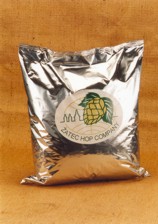 Since
then the amount of hops produced this way gradually increased, till it
exceeded the capacity of the line. By the end of the 80's it was decided
that a new place of business for pellet production with both types 90
and 45 lines should be built.
Since
then the amount of hops produced this way gradually increased, till it
exceeded the capacity of the line. By the end of the 80's it was decided
that a new place of business for pellet production with both types 90
and 45 lines should be built.
Gradually some business companies and stock companies (a.s.), also
Limited Companies (s.r.o.), arose, they purchase hops and after
cultivating and packing in the Zatec cooperative company, they sell it
to local breweries and export it abroad.
In the year 1992 the Union of Hop Traders was founded to protect the
interests of particular business companies. It associates all hop
business companies in the Czech - Republic.